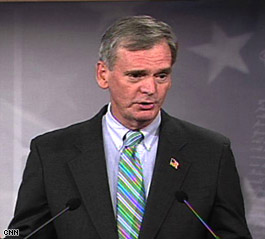If there was one thing policymakers could agree on during the recent economic turbulence, it was that interest rates on U.S. home mortgages ought to come down, and fast. But as the government stepped in recently to shore up the nation's banks, those rates went up.
Chalk up another case of unintended consequences.
Since the beginning of the crisis that has upended financial markets and stunned the world economy, the well-intentioned actions of governments and officials have often created new problems that require nearly equally urgent solutions.
The complexity and linkages in the world financial system are to blame.
"Every action the government takes has cascading effects on the market, and they're not always easy to predict," said Jim Vogel, an analyst at FTN Financial. "The government has to have time to catch up."
When authorities in Ireland and Greece guaranteed deposits, banks
across the rest of Europe feared a stampede out of their own countries,
forcing many governments to take the same precaution. The race to
guarantee deposits spread as far as Hong Kong and Singapore, where
banks are considered relatively stable.
When the U.S. Treasury announced it was guaranteeing money market accounts, it fanned fears of a run on bank accounts.
And by not protecting preferred stockholders when the government seized mortgage-finance firms Fannie Mae and Freddie Mac, it sunk investor confidence in preferred shares in other financial institutions, too, making it harder for them to raise money that way.
"It's like a chess game," said William Poole, who was president and chief executive of the Federal Reserve Bank of St. Louis from 1998 to this March. "You might be able to anticipate the next couple of moves. But after that, it gets very complicated, very quickly."
Virtually every emergency measure over the past few weeks has had secondary and sometimes unpredicted effects, according to economists, and this is one of the key dangers in the weeks ahead, as the government issues more short-term loans to corporations, buys toxic securities and invests in banks.
One of the first examples of unintended consequences came as Lehman Brothers filed for bankruptcy protection. The bank's fall spurred investors to pull out of money-market mutual funds, many of which were tied to Lehman debt. Fearing a run on money-market funds, the Treasury on Sept. 19 announced it would guarantee these funds.
That made money-market investors feel better. But in turn, it led
community bankers to erupt in protest as they saw investors pulling out
of their bank accounts to invest in money-market funds -- which always
paid more and now were just as safe.
'Business' 카테고리의 다른 글
| Wal-Mart seeks growth in small town China (0) | 2008.10.20 |
|---|---|
| Latin America wary of crisis-led IMF revival (0) | 2008.10.20 |
| Carriers Buy into Startups to Boost Their Networks (0) | 2008.10.19 |
| Advice for Today's Market? Diversify Wisely (0) | 2008.10.19 |
| Google's Profit and Sales Leap, Firing a Rally (1) | 2008.10.19 |
 √
√

